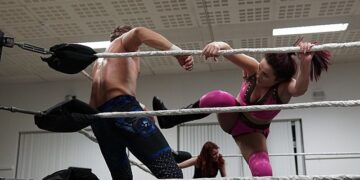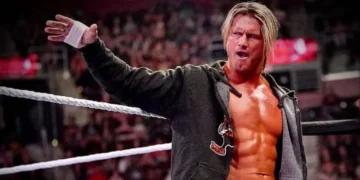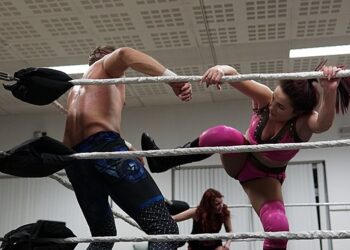Key Takeaways:
- The assessment of a wrestler being “overrated” is subjective and varies among fans and experts.
- Factors contributing to a wrestler being perceived as overrated include hype, marketing, and polarizing opinions.
- Past and present wrestlers who have faced criticism for being overrated include John Cena, Roman Reigns, and Hulk Hogan.
- Ultimately, the label of being overrated should be taken with a grain of salt, as personal preferences and biases heavily influence these judgments.
Are you tired of hearing the same names over and over again when it comes to the greatest wrestlers of all time? Well, you’re not alone.
In the world of professional wrestling, there are some individuals who have garnered massive popularity and fan followings, but are they truly deserving of all the hype?
In this article, we’re going to explore the most overrated wrestlers of all time – those who, despite their massive fan base, lacked the in-ring skills, technical ability, and justification for their pushes and championships. Get ready to delve into controversial topics, examine limited movesets, and question the decisions of influential wrestling organizations.
So, fasten your seatbelts, because we’re about to blow the lid off the overrated wrestlers that the industry can’t seem to let go of.
| Wrestler | Reason |
|---|---|
| The Great Khali | Limited wrestling skills, heavily reliant on his size |
| Hulk Hogan | Repetitive moveset, mediocre in-ring ability |
| Roman Reigns | Pushed heavily despite mixed fan reactions, lacks charisma |
| David Arquette | Unconvincing as a wrestler, won the WCW World Heavyweight Championship |
| Giant González | Poor in-ring ability, unimpressive matches |
Criteria for Overrated Wrestlers
When considering overrated wrestlers, two criteria to evaluate are their popularity and fan base, as well as their lack of in-ring skills and technical ability.
Additionally, examining unjustified pushes and championships can help identify overrated wrestlers in the industry.
Their Popularity and Fan Base
Their Popularity and Fan Base: A wrestler’s popularity is often measured by the size and dedication of their fan base. The more fans a wrestler has, the more likely they are to be considered popular.
Fan base plays a crucial role in a wrestler’s overall success and can impact their bookings, merchandise sales, and overall standing in the industry.
A wrestler with a large and enthusiastic fan base can often command higher pay and more opportunities. It is a testament to their talent and charisma when they can consistently draw in and connect with their fans.
Lack of In-Ring Skills and Technical Ability
Lack of in-ring skills and technical ability is a significant factor in determining whether a wrestler is overrated or not. No matter how charismatic or entertaining a wrestler may be, if they lack the necessary skills and technical prowess inside the ring, their performances will often fall flat.
Here are a few reasons why lack of in-ring skills and technical ability can contribute to a wrestler being deemed overrated:
- Poor execution of moves: If a wrestler consistently botches or fails to execute their moves properly, it can be frustrating for the audience to watch. It detracts from the overall performance and diminishes the credibility of the wrestler.
- Inability to tell a compelling story in the ring: Wrestling is all about storytelling, and a wrestler with limited technical ability may struggle to effectively convey a narrative during their matches. This can lead to a lack of emotional investment from the audience.
- Limited move set: Wrestlers who lack technical ability may rely heavily on a limited set of moves, making their matches predictable and repetitive. This can make their performances feel stale and uninspired.
- Inability to adapt to different wrestling styles: Wrestling is a diverse art form, with various styles and techniques. Wrestlers who lack technical ability may struggle to adapt to different styles, limiting their ability to put on exciting and dynamic matches.
Overall, the lack of in-ring skills and technical ability can diminish the overall quality of a wrestler’s performances, leading to them being overrated in the eyes of fans and critics alike. In order to avoid being overrated, wrestlers should continually strive to improve their in-ring skills and technical ability, ensuring that they can deliver compelling, high-quality matches.
Unjustified Pushes and Championships
Unjustified Pushes and Championships refer to instances in professional wrestling where a wrestler is given a prominent position or awarded a championship title without deserving it based on their in-ring abilities or fan reception. This can frustrate fans who feel that more deserving wrestlers are being overlooked.
It can also harm the credibility of the industry, as it undermines the concept of championships being earned through skill and hard work.
Unjustified pushes and championships can lead to disengaged audiences and a decline in viewership.
Hulk Hogan
Hulk Hogan: A polarizing figure in the world of professional wrestling.
The Hulkamania Phenomenon
The Hulkamania Phenomenon refers to the rise and popularity of Hulk Hogan in the 1980s and early 1990s.
Hogan’s charisma, larger-than-life persona, and impressive physique resonated with fans, making him a household name in professional wrestling.
His matches and promos captivated audiences, leading to huge ticket sales and record-breaking merchandise sales.
Hogan became the face of professional wrestling and played a crucial role in its mainstream success during that era.
Despite later controversies, there’s no denying the impact of the Hulkamania Phenomenon on the industry.
Limited In-Ring Skills
Limited In-Ring Skills refers to a wrestler’s ability to perform in the ring.
It is crucial for a wrestler to have a diverse range of in-ring skills to engage fans and create captivating matches.
Limited in-ring skills can hinder a wrestler’s ability to tell a compelling story and execute moves effectively.
It may result in repetitive moves, lack of innovation, and overall unimpressive performances.
A wrestler with limited in-ring skills may struggle to connect with the audience and fail to deliver the excitement and quality expected in professional wrestling.
Controversies Surrounding Hogan’s Legacy
Controversies Surrounding Hogan’s Legacy Hulk Hogan, a legendary figure in professional wrestling, has not been immune to controversies.
One of the most notable controversies surrounding Hogan’s legacy is his use of racist language, which was revealed in a leaked sex tape.
This incident tarnished his reputation and led to his suspension from the WWE.
Additionally, there have been allegations of Hogan making offensive and derogatory remarks about various individuals and groups.
These controversies have had a significant impact on how Hogan is perceived by both fans and the wrestling community.
John Cena
John Cena, a highly popular wrestler, has garnered immense fan support throughout his career.
Immense Fan Support
Immense fan support is a vital factor in the success and popularity of a wrestler. The passion and dedication of the fans can have a profound impact on a wrestler’s career.
When fans genuinely connect with a wrestler and rally behind them, it creates a captivating atmosphere for both the fans and the performer.
Fan support can elevate a wrestler’s status, leading to bigger opportunities and greater exposure. It is the unwavering support from fans that often helps wrestlers reach new heights in their careers.
Limited Moveset and In-Ring Ability
Limited Moveset and In-Ring Ability refers to a wrestler’s repertoire of moves and their overall skills inside the wrestling ring. It’s an important aspect that can make or break a wrestler’s performances.
Having a limited moveset can make matches predictable and repetitive, which can lead to decreased fan interest.
In addition, a lack of in-ring ability can result in sloppy and unconvincing performances, and it becomes evident when a wrestler struggles to execute even basic moves. A diverse moveset and strong in-ring ability are key elements for a wrestler to shine and engage the audience.
Critics’ View on Cena’s Position in WWE
Critics have a mixed view on Cena’s position in WWE.
Some argue that he was overrated due to his limited move set and predictable storylines.
They feel that he often took the spotlight away from other deserving wrestlers.
However, others believe that Cena’s popularity and dedication to the industry were undeniable.
They see him as a great ambassador and believe he brought mainstream attention to WWE.
In the end, opinions on Cena’s position in WWE differ among critics.
Ultimate Warrior
Ultimate Warrior was a charismatic and intense character in the world of wrestling.
Charismatic and Intense Character
A charismatic and intense character is vital in professional wrestling. It captivates the audience and keeps them invested in the storyline.
When a wrestler possesses charisma and intensity, it becomes easier for the fans to connect with them emotionally.
It is their larger-than-life presence and ability to engage the crowd that makes them stand out. Their energy and passion can truly elevate a wrestling match and make it unforgettable.
So, having a charismatic and intense character is a crucial aspect for a wrestler’s success in the industry.
Limited In-Ring Skills
Limited In-Ring Skills Limited in-ring skills can greatly impact a wrestler’s ability to engage the audience and deliver an exciting performance.
Poor technique, lack of agility, and limited moveset can make matches predictable and boring.
Wrestlers with limited skills struggle to adapt to different opponents and fail to create compelling storylines in the ring.
They often rely on repetitive moves and lack the ability to perform high-risk maneuvers.
Ultimately, limited in-ring skills can hinder a wrestler’s overall success and prevent them from reaching their full potential in the industry.
Controversial Personal and Professional Conduct
Controversial Personal and Professional Conduct: Controversial personal and professional conduct refers to actions and behaviors exhibited by wrestlers that have sparked controversy and divided opinions among fans, colleagues, and industry insiders.
These behaviors can range from offensive or derogatory remarks, to questionable actions both inside and outside the wrestling ring.
They often garner attention and create drama within the wrestling community, but can also negatively impact reputations and even result in disciplinary actions.
Examples include incidents of racism, misconduct, or unethical behavior, which can have lasting consequences for a wrestler’s career and public image.
Goldberg
Goldberg, a wrestler known for his explosive entrance and dominant streak.
Explosive Entrance and Dominant Streak
Goldberg is known for his explosive entrance and dominant streak in the wrestling world.
When he burst onto the scene, his entrance was electrifying, capturing the audience’s attention with his intense energy.
Once the match began, Goldberg showcased his dominant streak by overpowering his opponents and delivering devastating moves.
His combination of a powerful entrance and dominant in-ring performances made him a force to be reckoned with, solidifying his status as one of the most memorable wrestlers in history.
Lack of Technical Wrestling Ability
Lack of technical wrestling ability can be a significant setback for a wrestler. Technical wrestling involves skills like mat grappling, submissions, and chain wrestling.
It requires precision, strategy, and versatility.
When a wrestler lacks technical ability, their matches can become repetitive and predictable. They may struggle with executing complex moves and submissions, limiting their options in the ring.
This can hinder their ability to tell compelling stories and engage the audience.
While charisma and athleticism are important, having a solid technical foundation is crucial for a well-rounded wrestler.
His Shortcomings in Extended Matches
His shortcomings in extended matches include a lack of technical skills, limited move set, and limited stamina.
Goldberg’s wrestling style heavily relies on power moves and explosive bursts of energy.
However, when it comes to longer matches, his limited moves can become predictable, and his lack of technical skills can be exposed.
Additionally, his lack of stamina can make it difficult for him to maintain the same level of intensity throughout an extended match.
These factors make him less effective in longer bouts.
Roman Reigns
Roman Reigns has been pushed as the next face of WWE.
Pushed as the Next Face of WWE
Pushing a wrestler as the next face of WWE is a strategic move to showcase their talent and create a new star.
It involves giving them a significant amount of TV time, high-profile matches, and title reigns.
However, being pushed as the next face doesn’t always guarantee success.
Past examples like Roman Reigns show that sometimes the fans may not react positively to the chosen wrestler, leading to criticism of their overrated status.
Mixed Fan Reactions
Mixed fan reactions are a common occurrence in the world of professional wrestling. Some fans adore certain wrestlers, while others are not so fond of them.
It’s natural for people to have different opinions and preferences when it comes to entertainment.
This diversity of opinions is what makes wrestling such a unique and engaging form of entertainment. While some fans may be vocal in expressing their support or dislike for a wrestler, it’s important to remember that everyone has their own taste and should be able to enjoy the sport in their own way.
Questionable Booking Decisions
Questionable Booking Decisions in wrestling can have a big impact on a wrestler’s career and the overall quality of a show. Here are a few examples of questionable booking decisions:
- Pushing a wrestler too quickly: When a wrestler is pushed into the spotlight too soon without proper character development or in-ring skills, it can lead to mediocre matches and lack of fan interest.
- Burial of talent: If a promotion consistently books certain talented wrestlers to lose matches or be portrayed as weak, it can harm their credibility and fan support. It’s important to utilize talent effectively and give them the chance to shine.
- Inconsistent storylines: When storylines have too many plot holes, sudden changes, or lack of continuity, it can confuse and frustrate the audience. Consistency in storytelling is essential to keep fans engaged.
- Overdependence on part-time wrestlers: While having part-time wrestlers can bring star power, relying too heavily on them can overshadow full-time talent and hinder their growth. Balancing part-time and full-time wrestlers is crucial for long-term success.
- Mishandling of heel and face turns: A sudden and poorly executed switch from heel to face (or vice versa can confuse the audience and weaken the impact of the turn. Proper buildup and logical reasons behind the character shift are important for effective storytelling.
Overall, making questionable booking decisions can negatively impact the success and enjoyment of wrestling shows. It’s crucial for promotions to carefully plan and consider the long-term consequences of their booking decisions.
FAQ
What Makes a Wrestler Overrated?
What Makes a Wrestler Overrated?
A wrestler is often considered overrated when their skills and abilities are exaggerated or overhyped compared to their actual performance in the ring.
It could be due to factors such as their popularity, charisma, or their association with a famous wrestling promotion.
Lack of in-ring ability, repetitive movesets, and reliance on gimmicks without substantial wrestling skills can also contribute to a wrestler being deemed overrated.
Ultimately, it boils down to fans’ expectations not aligning with the wrestler’s actual abilities and contributions in the ring.
Is Being Overrated Always Negative?
Being overrated is not always negative. Sometimes, a wrestler may receive more attention or praise than they deserve, but it can also be a result of their popularity and mass appeal.
It’s subjective and depends on personal opinion.
While being overrated can lead to inflated expectations, it doesn’t necessarily mean the wrestler is bad or unworthy. It’s important to remember that opinions on wrestling are subjective, and what may be considered overrated by some may be highly regarded by others.
How Should Wrestlers Be Evaluated?
When evaluating wrestlers, it’s important to consider several factors.
- In-ring ability: Look at their technical skill, athleticism, and ability to tell a story in the ring.
- Charisma: Evaluate their ability to connect with the audience, whether through their promo skills or their presence in the ring.
- Longevity: Consider how long they have been successful and relevant in the industry.
- Impact: Assess their influence on the wrestling world, whether through their matches, storylines, or character.
- Championship wins: While not the only measure of success, multiple championship reigns can indicate a wrestler’s credibility.
- Fan reaction: Take into account how the audience responds to a wrestler, as their support or lack thereof can be telling.
By considering these factors, we can evaluate wrestlers based on their overall impact, skill, and connection with the audience.
Final Verdict
The world of professional wrestling has seen its fair share of overrated wrestlers throughout history. These individuals often achieve immense popularity and have a dedicated fan base, but their in-ring skills and technical ability leave much to be desired.
Additionally, many of these wrestlers have received unjustified pushes and championships, further perpetuating their overrated status.
Examples such as Hulk Hogan, John Cena, Ultimate Warrior, Goldberg, and Roman Reigns have all garnered significant attention and success, but their limitations and controversies cannot be ignored. It is important to note that being overrated does not necessarily mean these wrestlers are devoid of talent or entertainment value.
They have managed to capture the hearts of fans and generate immense excitement.
However, their deficiencies in areas such as in-ring skills, technical ability, and questionable booking decisions have sparked critiques and divided opinions among the wrestling community. Ultimately, the evaluation of wrestlers should encompass a holistic approach.
Factors such as charisma, character development, fan support, and in-ring performance must be taken into account.
While a wrestler’s popularity and fan base are vital, it should not overshadow their technical prowess and ability to consistently deliver compelling matches. In conclusion, the most overrated wrestlers often combine elements of limited in-ring skills, controversies surrounding their legacy, and unjustified pushes and championships.
While they may have achieved great success, their deficiencies have led to divided opinions among fans and critics alike.
Proper evaluation of wrestlers should consider various factors to accurately assess their overall contribution to the wrestling industry.

































